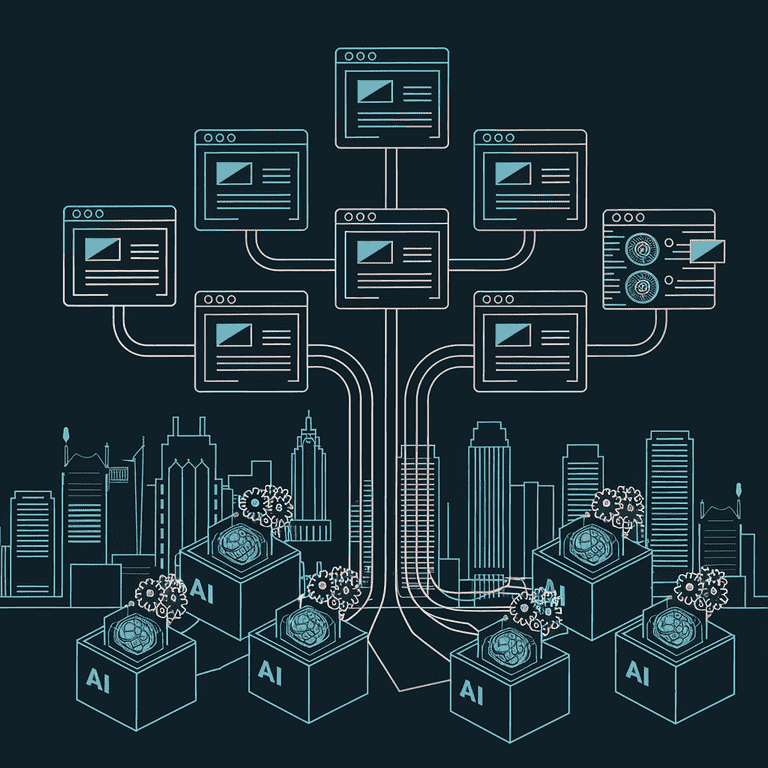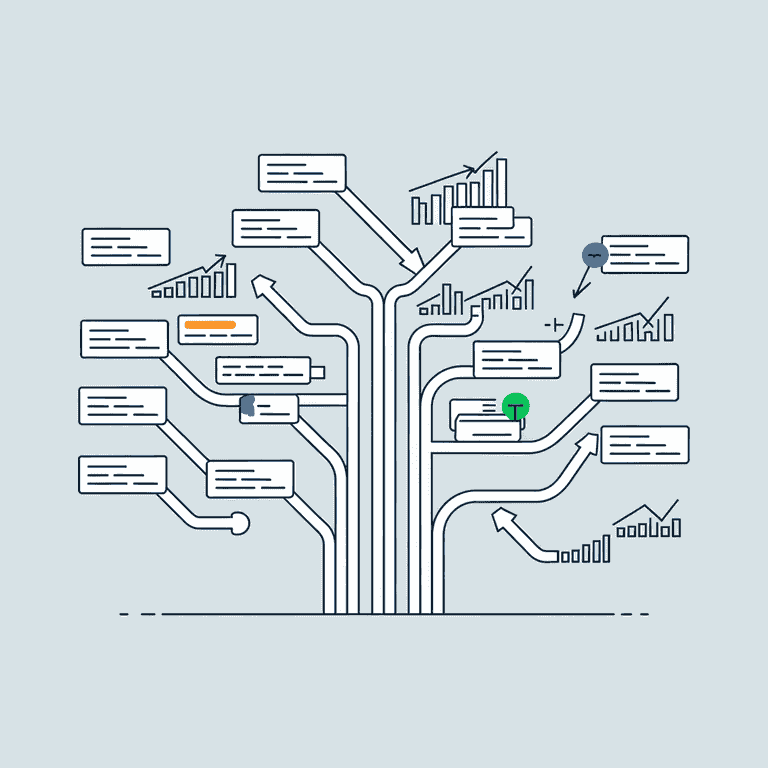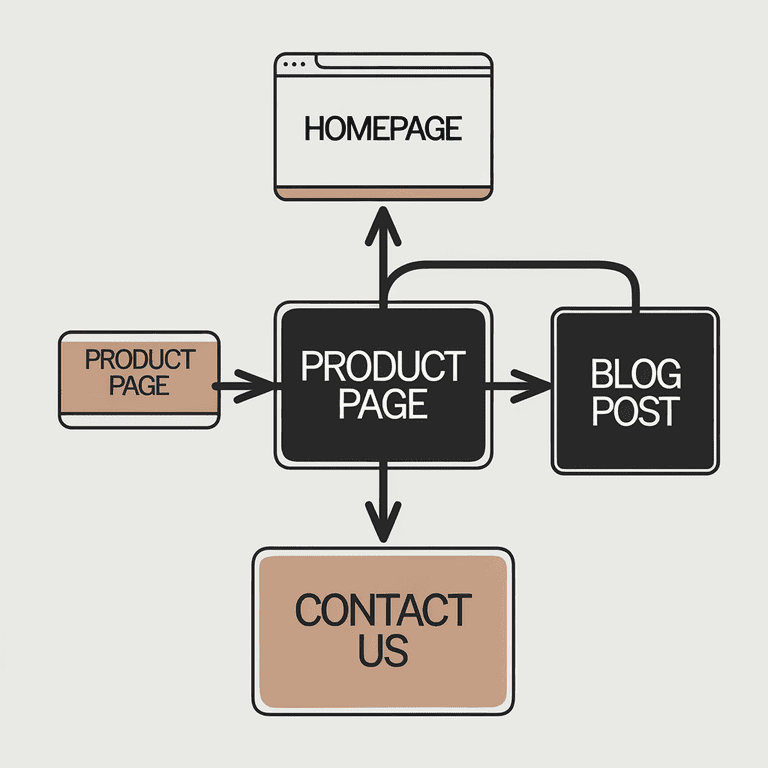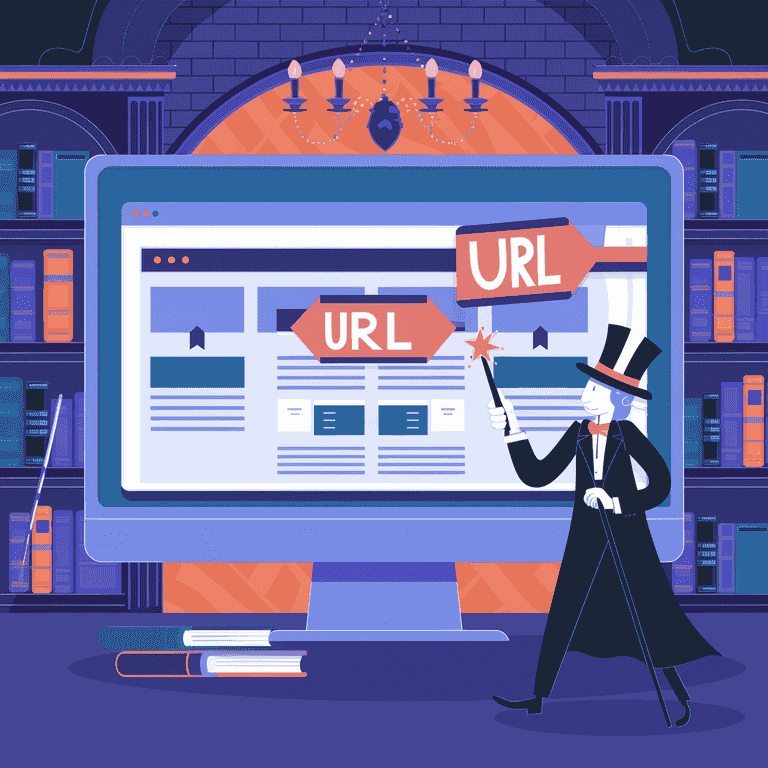In today’s digital landscape, every element of your website plays a crucial role in determining your SEO performance. One of the most important yet often overlooked components is the URL structure. But here’s the good news: with the help of AI, optimizing your URL structure has never been easier or more efficient.
AI-powered URL analysis tools are transforming the way businesses approach URL optimization. Instead of manually reviewing and adjusting every URL on your website, AI tools can swiftly identify problems and offer automated solutions. This leads to improved SEO performance, better user experience, and more efficient management of your digital assets.
In this article, we will dive deep into the concept of AI URL analysis, explore the benefits of using AI for URL structure optimization, and guide you through best practices to get the most out of these tools.

What is AI URL Structure Analysis?
Definition of URL Structure and Its Significance
Before diving into AI-powered analysis, it’s essential to understand URL structure. URL structure refers to the format and organization of URLs within your website. It includes elements such as the domain name, subdirectories, and slugs (the part of the URL that comes after the domain name).
A well-structured URL is crucial for both search engines and users. It tells search engines what a page is about and makes it easier for users to understand and navigate your website. Poor URL structure can confuse search engines, harm SEO performance, and frustrate users.
How AI Tools Analyze URL Structures
AI URL analysis tools scan your entire website to assess the structure of each URL. These tools use machine learning algorithms to detect various issues, such as:
- Broken links: Identifying URLs that lead to 404 errors.
- Unoptimized slugs: Finding long or irrelevant URL slugs.
- Poor syntax: Detecting unnecessary characters or improper punctuation in URLs.
- Duplicate content: Identifying URLs that lead to the same or similar content.
Once the AI has analyzed your URLs, it provides insights and suggestions for optimization. These suggestions involve shortening URLs, changing slugs, or redirecting outdated or broken links.
The Role of AI in Identifying URL Issues
AI is highly effective at identifying patterns and potential issues in URL structures that might go unnoticed by humans. Here’s how it works:
- Data-driven insights: AI uses data from thousands of websites to learn best practices for URL structure.
- Automated detection: AI can automatically scan and detect issues that could negatively impact SEO, such as duplicate content or broken links.
- Actionable recommendations: AI tools suggest changes that improve SEO and user experience based on the identified issues.
In the next section, we’ll explore some of the most popular AI-powered URL analysis and optimization tools. These tools can save you time and resources while improving your website’s performance.
AI Tools for URL Optimization
Introduction to Popular AI URL Analysis Tools
Several AI tools have emerged, each designed to help you optimize URL structure and improve your website’s SEO performance. Here are a few noteworthy tools:
- Ahrefs: Known for its robust SEO toolset, Ahrefs offers URL analysis features that help identify broken links, redirect loops, and other structural issues.
- SEMrush: This all-in-one marketing toolkit includes URL audit tools that provide insights into URL structure and optimization opportunities.
- Screaming Frog SEO Spider: A popular SEO crawler that detects issues like duplicate URLs, poor slugs, and broken links.
- Moz Pro: Offers URL analysis to help identify and fix URL issues that impact SEO.
Key Features of AI-Powered URL Analysis Tools
AI-powered URL optimization tools have various features that make URL structure analysis efficient and actionable. Here are some key features:
- Automated error detection: AI tools can quickly detect issues like broken links or redirect loops, which would take hours to spot manually.
- Predictive SEO performance analysis: These tools can analyze how a URL’s structure impacts its SEO performance and suggest changes that might improve rankings.
- Scalability: AI tools can handle websites of all sizes, from tiny blogs to large e-commerce sites with thousands of pages.
- Real-time insights: AI tools provide instant feedback and recommendations, making it easier to implement changes immediately.
Here’s a brief comparison of some of these tools:
Tool | Key Features | Best For |
Ahrefs | Link audits, keyword analysis, broken link detection | Website audit & backlink analysis |
SEMrush | URL crawling, SEO audit, keyword tracking | Comprehensive SEO strategy |
Screaming Frog | URL crawling, duplicate content detection | Deep site audits |
Moz Pro | SEO analytics, link analysis, page optimization | On-page SEO optimization |
How AI Tools Improve Efficiency and Accuracy in Analyzing URLs
One of the major advantages of AI tools for URL analysis is their efficiency. These tools eliminate the need for manual checks, which can be tedious and time-consuming. By automating the process, AI helps businesses optimize URLs faster and with greater accuracy.
For instance, AI tools can handle complex websites with large numbers of URLs. They can quickly detect issues and even suggest improvements, which would take human analysts a lot more time to process. Additionally, AI tools continuously learn from new data, improving their recommendations over time.
In the next section, we will explore the key benefits of AI URL analysis and optimization, highlighting how these tools enhance SEO performance and the user experience.

Benefits of AI URL Analysis and Optimization
AI-powered URL analysis isn’t just about fixing minor issues—it has a broad range of benefits that can enhance your website’s overall performance. By optimizing your URL structure, you can improve your SEO and user experience and even save time and money. Let’s dive into how AI-powered tools make these improvements possible.
Improved Search Engine Ranking
URL structure plays a crucial role in your website’s search engine ranking. A well-optimized URL is more manageable for search engines to crawl, understand, and index. Here’s how AI helps:
- AI identifies keyword opportunities: AI tools can suggest how to incorporate relevant keywords into your URLs best, improving your chances of ranking higher for targeted search terms.
- AI reduces crawl errors: When URLs are well-structured, search engines can easily crawl and index them, ensuring your site is fully indexed and accessible to users.
- Fixing broken or duplicate links: AI tools quickly find and fix broken links or duplicate URLs, which can harm SEO by diluting page authority.
By optimizing your URLs with AI recommendations, you make it easier for search engines to crawl your pages, improving visibility and search engine ranking.
Enhanced User Experience
An excellent URL structure doesn’t just help search engines; it also helps your users navigate your site. Here’s how AI makes a difference:
- Simplified URLs for better navigation: AI can suggest ways to shorten long or complex URLs, making them more user-friendly.
- Descriptive and meaningful URLs: AI helps create more meaningful URLs by recommending changes to URL slugs, which makes it clear to users what kind of content they can expect.
- Mobile-friendly URLs: AI can analyze patterns to optimize URLs for mobile devices, improving mobile users’ experience.
The result? Users can easily understand and remember URLs, quickly navigate your site, and find the content they need faster.
Time and Cost Efficiency
AI-powered URL analysis tools can save both time and money. Here’s how:
- Automated URL audits: Instead of manually checking each URL, AI tools can scan thousands of pages in a fraction of the time, detecting issues that need attention.
- Reduced manual labor: With AI handling much of the analysis, your team doesn’t have to spend hours or days on URL optimization, freeing up resources for other important tasks.
- Actionable insights: AI identifies issues and suggests practical solutions, eliminating the need for guesswork.
By automating the URL optimization process, AI makes your workflow more efficient, allowing you to focus on other aspects of your SEO and marketing strategies.
The AI URL Optimization Process
The AI URL optimization process is a step-by-step journey from identifying issues to implementing improvements. Here’s how the process typically works.
Step-by-Step Breakdown of AI URL Analysis
- Crawling and indexing URLs
- The AI tool starts by crawling your website to collect all the URLs. This includes everything from main pages to individual blog posts and product pages.
- Detecting issues in structure and content
- Once all the URLs are collected, the AI analyzes each one for topics such as:
- Broken links (404 errors)
- Duplicate content (multiple URLs pointing to the same content)
- Unoptimized URL slugs (long, unclear, or irrelevant slugs)
- Poor syntax (use of underscores, special characters, etc.)
- Providing actionable insights and recommendations
- After detecting issues, the AI presents suggestions to improve your URLs. These might include:
- Shortening long URLs
- Removing unnecessary characters
- Adding keywords to enhance SEO
- Redirecting broken or duplicate URLs
- Monitoring URL performance over time
- AI tools continuously monitor your URLs for any new issues. They track changes in rankings, crawl errors, and other performance metrics, ensuring that your site stays optimized.
How AI Can Automate Changes in URL Structure
AI doesn’t just stop at analysis—it can also help implement changes:
- Changing URL slugs: AI can automatically suggest or even change slugs for better SEO, readability, and user experience.
- Redirecting outdated URLs: When a URL becomes obsolete or changes, AI can help set up automatic redirects to avoid 404 errors and maintain traffic flow.
- Updating broken links: AI tools can identify and suggest fixing or removing broken links, ensuring smooth navigation for users and search engines.
The following section will examine some common URL structure issues that AI tools can identify and fix. If left unaddressed, these problems can seriously affect your site’s performance.

Common URL Structure Issues Identified by AI
Even with the best intentions, URL structure can sometimes go awry. Here are a few common issues AI-powered tools can easily spot and help fix.
Duplicate Content and Its Impact on SEO
- What’s the problem?
- Duplicate content happens when multiple URLs lead to the same or very similar content. This dilutes the value of each page, confusing search engines about which version to index or rank.
- How AI helps:
- AI tools can detect duplicate URLs and recommend canonicalization, which helps search engines understand which version of a page is the “main” one.
Unoptimized URL Slugs
- What’s the problem?
- Slugs are the part of the URL that comes after the domain name. Overly long, generic, or cryptic slugs can confuse users and search engines.
- How AI helps:
- AI tools suggest ways to shorten slugs and make them more descriptive. For example, turning a URL like www.example.com/product?id=12345 into www.example.com/product/organic-skin-care.
Poor Use of Hyphens, Underscores, and Special Characters
- What’s the problem?
- URLs with underscores or special characters can be more complicated for search engines to read and for users to remember.
- How AI helps:
- AI tools can recommend best practices for URL syntax. For instance, AI suggests using hyphens instead of underscores (e.g., my-product-page instead of my_product_page) and avoiding special characters that don’t add value.
Using AI-powered tools, these common URL issues can be identified and addressed, helping you avoid potential SEO pitfalls. In the next section, we’ll discuss best practices for URL optimization that can help you stay ahead of the curve.
Best Practices for AI-Driven URL Optimization
While AI tools do a lot of the heavy lifting when it comes to optimizing URL structures, there are also some tried-and-true best practices you can follow to ensure your URLs are always performing at their best. By combining AI-driven insights with these best practices, you can stay ahead in the SEO game.
Creating Short and Descriptive URLs
- Why it matters:
Short URLs are easier to read, share, and remember. Descriptive URLs tell both users and search engines exactly what the page is about. It’s essential for enhancing user experience and SEO. - How AI helps:
AI tools often suggest ways to shorten long or complicated URLs, while keeping them meaningful. For example, a URL like www.example.com/articles/technology/how-to-choose-best-laptop-for-you could be simplified to www.example.com/choose-best-laptop. - Best practice:
Keep URLs concise but descriptive. Avoid unnecessary words or characters that don’t add value.
Including Target Keywords in URL Structure
- Why it matters:
URLs that include target keywords can improve search engine rankings. Keywords in the URL are a signal to search engines about the content of the page. - How AI helps:
AI tools can analyze the content of your pages and recommend relevant keywords to include in your URLs. For example, if you have a page about “organic skincare products,” AI might suggest a URL like www.example.com/organic-skincare-products. - Best practice:
Choose keywords that are both relevant and specific. Avoid keyword stuffing, as it can hurt both user experience and SEO.
Using AI to Regularly Monitor and Update URLs for Better SEO
- Why it matters:
SEO is not a one-time task. As your website grows and evolves, so should your URLs. Regularly updating and optimizing URLs ensures they stay fresh, relevant, and effective. - How AI helps:
AI tools can continuously monitor your website for URL performance and suggest updates when necessary. Whether it’s changing a URL slug or fixing a broken link, AI can help keep your URLs in top shape. - Best practice:
Perform regular URL audits using AI tools to catch issues early and ensure your URLs remain optimized as your website evolves.

How AI URL Analysis Impacts SEO Strategy
AI-powered URL analysis can significantly enhance your broader SEO strategy. Let’s break down exactly how URL optimization influences SEO and the bigger picture of your digital marketing efforts.
The Relationship Between URL Optimization and Higher SEO Rankings
Search engines like Google pay close attention to URL structure when deciding how to rank pages. URLs that are simple, descriptive, and keyword-optimized are more likely to perform well. Here’s how AI URL optimization ties into SEO success:
- SEO-friendly URLs:
AI tools help create URLs that align with SEO best practices, improving your chances of ranking higher for relevant search terms. - Crawlability and indexation:
Well-structured URLs are easier for search engines to crawl, which means more pages on your site are indexed and available for ranking. - Improved click-through rates (CTR):
URLs that clearly describe the content tend to get more clicks from users, improving CTR and contributing to better rankings.
How AI URL Analysis Contributes to Link-Building Efforts
Link-building is another crucial part of SEO, and AI URL optimization plays a role here too. Here’s how:
- Broken link detection:
AI can identify and fix broken internal and external links, ensuring that your site has no dead ends. This helps maintain a smooth flow of link equity across your website. - Optimized anchor text:
By improving URL structure, AI also helps ensure that the anchor text used in your internal links is relevant and helpful, which contributes to better link-building.
AI and Mobile-First Indexing: Optimizing URLs for Mobile Search
Google now uses mobile-first indexing, meaning it prioritizes the mobile version of your website when ranking pages. AI plays a big role in ensuring that your URLs are mobile-friendly:
- Short, readable URLs:
Mobile users benefit from short, simple URLs that are easy to type or click. AI tools help ensure that URLs are optimized for mobile viewing and user experience. - Optimized for speed:
AI can identify URLs that lead to slow-loading pages and recommend ways to improve them, such as shortening URLs or optimizing content.
By optimizing your URLs for mobile, you’re not just improving your SEO—you’re also providing a better experience for the increasing number of mobile users.
Future of AI-Powered URL Optimization
The digital landscape is constantly evolving, and AI is right at the forefront of these changes. As search engines become smarter and user expectations shift, AI will continue to play a crucial role in URL optimization.
AI’s Evolving Role in URL Analysis as Search Engines Evolve
Search engines like Google are continuously improving their algorithms, and AI is an essential tool for keeping up with these changes. AI URL optimization tools are always learning from new data, adjusting their recommendations to align with the latest SEO trends.
For instance, as search engines get better at understanding user intent, AI tools may become even more sophisticated at recommending URLs that align with what users are looking for. This means that the future of AI URL optimization is about staying one step ahead of algorithm changes.
The Integration of AI in Broader SEO Strategies and Marketing Techniques
AI-driven URL analysis is just one piece of the larger SEO puzzle. As AI continues to evolve, it will become more integrated with other marketing strategies, such as content marketing, social media optimization, and paid search. This integration will provide even more comprehensive insights and help businesses improve their overall digital marketing efforts.
- Predictive analytics:
AI will be able to predict trends in URL performance based on data from search engines and user behavior, allowing for even more proactive optimization. - Personalized recommendations:
AI will offer increasingly personalized suggestions based on a site’s specific needs and goals, leading to more customized SEO strategies.
Breaking It All Down
AI-powered URL analysis and optimization can have a huge impact on your website’s performance. From boosting your SEO rankings to improving user experience, the benefits are undeniable. By following best practices, leveraging AI tools, and regularly optimizing your URLs, you can ensure that your website is always in top shape.
URL structure may seem like a small part of your website, but as we’ve seen, it can have a major influence on your site’s success. So, why not take advantage of AI to make URL optimization easier, faster, and more effective?
Start optimizing your URLs today, and you’ll soon see the positive impact on your SEO performance, user experience, and overall website success.
Frequently Asked Questions
What are the key factors to consider when creating a good URL structure?
A URL structure should be simple, descriptive, and easy to read. Key factors include:
- Descriptive slugs: Use words that clearly explain the page’s content.
- Keyword inclusion: Include relevant keywords for SEO, but avoid keyword stuffing.
- Short URLs: Avoid long, complicated URLs; they should be concise and memorable.
- Avoid special characters: Stick to hyphens for separating words and avoid underscores, spaces, and special characters.
How does AI determine the best URL structure for my site?
AI tools analyze your website’s content and structure using advanced algorithms. They consider factors like keyword relevance, readability, and SEO best practices. By learning from large datasets, AI can suggest optimized URLs that enhance user experience and search engine rankings.
Can AI tools automatically change my website's URLs?
Yes, many AI-powered URL optimization tools offer automated features that can change or suggest changes to your URLs. For example, AI can recommend shorter slugs or automatically implement redirects to handle broken or outdated URLs. However, always review AI recommendations before implementing them to ensure they align with your site’s overall strategy.
How often should I audit my URLs using AI tools?
It’s a good practice to audit your URLs regularly—at least once a quarter or whenever you make significant changes to your website. Frequent audits help catch issues early and ensure your URLs remain optimized as your site grows or updates.
Are AI-driven URL optimization tools expensive?
The cost of AI-driven URL optimization tools can vary widely depending on the features you need and the scale of your website. Some tools offer free versions with limited features, while others provide more robust paid plans. While some advanced features might require a subscription, they often provide a return on investment by saving time and improving your website’s SEO performance.
Can AI help with optimizing URLs for local SEO?
Yes! AI can suggest URL structures that are optimized for local SEO. For instance, if your business serves a specific geographic area, AI can recommend including the city or region in your URLs to help improve visibility for local searches.
How do AI tools deal with multilingual or multi-region websites?
AI tools can analyze URL structures across different languages and regions for multilingual or multi-region websites. They can suggest localized URLs, including language or country codes (e.g., /en/ for English, /fr/ for French) to help ensure that search engines correctly index the pages based on geographic or language-specific criteria.
What impact does URL optimization have on mobile SEO?
URL optimization is crucial for mobile SEO because mobile users prefer shorter, cleaner URLs. AI tools can ensure your URLs are mobile-friendly by making them easier to read and load quickly. Additionally, optimizing URL structure for mobile devices improves the chances of ranking your site well in mobile-first search results.
Can AI tools help with setting up URL redirects?
AI tools can help detect outdated or broken URLs and recommend or automatically set up redirects. This is especially useful when you restructure your site or remove pages. Proper redirects ensure users and search engines are directed to the correct page, maintaining the flow of traffic and link equity.
Is it safe to rely on AI tools for URL optimization?
AI tools are highly effective and safe, especially when reviewing their recommendations. However, it’s always a good idea to ensure that any changes made to your URLs align with your broader SEO and content strategy. While AI can provide valuable insights, human judgment is still necessary to maintain the overall integrity of your site’s structure.
How can AI-powered URL analysis improve my site's link-building efforts?
AI-powered URL analysis helps identify broken links, duplicate URLs, and other structural issues that could hinder your link-building efforts. By fixing these problems, AI ensures that internal and external links flow smoothly, strengthening your site’s overall link profile and improving SEO.
Do AI URL optimization tools require technical knowledge to use?
Many AI tools are designed to be user-friendly, even for those without technical expertise. While some SEO and website structure knowledge can be helpful, most tools provide easy-to-follow recommendations that guide you through the optimization process without requiring advanced technical skills.
Offsite Resources For You
Here are some valuable offsite resources related to URL analysis, SEO optimization, and website performance that you may find helpful:
Moz – https://moz.com
Moz offers a wealth of resources for SEO, including guides, tools, and insights on how to improve your website’s performance.
Yoast SEO – https://yoast.com
Yoast is one of the most popular tools for SEO, with a comprehensive suite of resources for optimizing URLs and improving search rankings.
Search Engine Journal – https://www.searchenginejournal.com
Search Engine Journal is a go-to for all things SEO, offering expert advice on best practices, trends, and tools for website optimization.
Ahrefs – https://ahrefs.com
Ahrefs is known for its powerful SEO tools, offering detailed analysis on URL structures and backlink strategies to enhance your website’s SEO.
Neil Patel – https://neilpatel.com
Neil Patel provides insightful content and tools to help optimize URLs, improve your SEO strategy, and boost website traffic.
SEMrush – https://www.semrush.com
SEMrush offers a comprehensive set of SEO tools for analyzing and improving URL structures, keyword optimization, and overall site performance.
Google Search Central – https://developers.google.com/search
Google’s own resource for webmasters and developers provides crucial information on optimizing your website, including best practices for URL structure and SEO.

What's Next?
As a small business owner, it’s important to remember that the SEO tips on this page were provided by our co-founder, Matt LaClear. Since 2009, Matt has worked on over 13,277 SEO campaigns for clients, providing expert insights and strategies to help businesses grow online.
Take advantage of Matt’s special offer and get a free custom SEO strategy call! This is a unique opportunity to receive personalized advice on how to improve your website’s SEO, optimize your URLs, and enhance your online presence. Don’t miss out on this chance to take your business to the next level with expert guidance from Matt LaClear.

